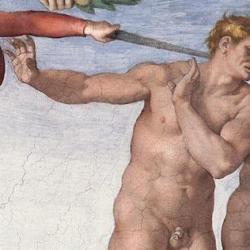In his book on the gospel in Genesis, Warren Gage notes that the book tell a tale of three cities:
“Cain set out to found and build an earthly city, his descendants developing a technology suited to creating an earthly paradise. Cain’s city was located in the east (4:16), which would have been watered by the Tigris, the easternmost river of paradise (Gen 2:14). Founded by a fratricide who lived in fear of his life, the city and its community would have provided a place of security. This city of the Cainite line was apparently unrivaled as the great cosmopolis of antiquity. Through intermarriage (Gen 6:2) its citizens subdued the earth to the apostasy of their father Cain, filling the world with violence . . . The flood of Noah was the overthrow of this first great urban enterprise of fallen man.”
“Like Enoch, Babel was founded in the east (11:2). It was watered by the Euphrates, one of the rivers of paradise (Ps 137:1). Babel represented the rebellion of man against the divine command to subdue the earth under God, for the spirit of Babel was federal and imperial to the glory of man (Gen 11:4) and the state (Gen 10:10). Founded as a garden city on a plain (11:2), Babel nevertheless lacked the mountain motif of paradise, but by technology its citizens set about to build a tower which would reach into heave. In the judgment of God upon this earthly city the unfinished tower (Gen 11:8) remained as a remembrance of the frustrated purpose of man to subdue the earth in disobedience.
“Like Enoch and Babel, Sodom is associated in scripture with the east (Gen 13:11). It was watered by the Jordan, giving every outward appearance of the garden of paradise (13:10). Sodom, however, represented the rebellion of man against the divine mandate to be fruitful and multiple, and the sin of Sodom . . . .represented the rejection of God as Creator and the exchange of the truth for a lie (Rom 1:25). Founded as a garden city upon a plain (Gen 13:10), Sodom likewise lacked the mountain motif of paradise, but the judgment of God upon this earthly city left the pillar of salt, a mocking reminder that the spirit of this city was contrary to the fertility associated with the mountain of the true paradise.”















